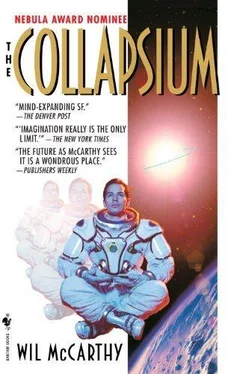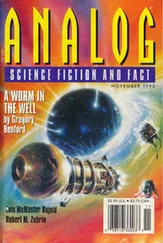In other words, a ship outfitted with such a cap would feel less than one-thousandth of the actual gee forces it was subjected to. More significantly, it would require less than one-thousandth of the fuel and travel time of a conventional ship. This was hardly the magic glove of his dream, but this hypothetical spaceship could—with barely a whiff of fuel in its tanks—accelerate at a thousand gees or more without damage or even discomfort to its occupants.
The problem—found only after an initial, ill-advised burst of smug excitement—was that immeasurably tiny rounding errors had gradually accumulated in the hypercomputers’ innumerable calculations. He’d never have believed it possible, but when he painstakingly worked out a closed-form solution to confirm the final design, his direct calculations yielded a mass fully 15.028% larger than the iterative solution had yielded. Perhaps no one had ever pushed a computer so hard, forced so many calculations based on calculations based on calculations, to achieve a result so weirdly inaccurate. He’d never heard of such a thing happening before.
Here, though, the error was critical: Bruno’s collapsium reserves were right at the ragged edge of useful size. Actually, on the wrong side of the ragged edge—he was nearly 1.5 trillion tons shy of the mass required to achieve any measurable effect at all.
The boat gods were angry indeed. Absently, he murmured a little prayer to appease them.
Then he permitted himself a discouraged sigh. Sinking down into superstition was not a good sign right now. That the boat gods weren’t “real” made little difference; the human brain was wired for animism and anthropomorphism as much as for monarchy. Hammered by billions of years of evolution, it had learned to devote most of its enormous pattern-matching power to guessing the moods and likely actions of prey animals, and predators, and fellow human brains, which of course were the most complex and dangerous of all. And like any hypertrophied athlete, it had lost generality in the process, so that it tended to turn the same sort of attention toward natural phenomena—especially pseudo-random or chaotic events—treating them as entities to be studied and modeled and, if at all possible, appeased.
So even in mono- or atheistic cultures, you inevitably found Mother Nature and Grim Reaper analogs, along with whole pantheons of other demigods and spirits and patron saints inspired by the myriad processes of the world around them. In the early ages of rationalism, these beings were often dismissed as either idle fantasies or as a kind of shorthand for pseudo-mystical concepts like Murphy’s Law and Karma and Fate, which were themselves a shorthand for rigorous, statistical observations about the fate of individuals in society. And if science had long recognized that the mind did model them as entities, that made them real enough to cause real problems, even if these problems were quite separate from the phenomena that implied them.
Blast it, Bruno had hardly spared a thought for the boat gods in sixty years. At Talafo’ou they’d made their presence known, grudgingly rewarding his Redshift labors but also decisively punishing all hubris and presumption. And demanding, yes, a steady sacrifice in disappeared tools and fasteners. Tonga’s old gods were officially dead—not even Tamra had been eager to share their names or histories with him—and it had taken time to arrive at a nonverbal understanding with them, once they’d shown him for sure who was boss. But this time he hadn’t considered their needs at all. Nonexistent or no, they were bound to take that personally. And they had access to his brain.
He rose from his chair, prepared to curse or pray or go looking for something tangible to sacrifice—but gasped at the sensation of gravity pulling down at him. A full gee’s worth of gravity, created by fifteen hundred neubles at the planet’s core! Why, if he could simply extract those, then perhaps the situation could be salvaged after all!
Encouraged, he plopped into the chair again and rattled some more calculations into the hypercomputers, deeply informed now by all that he had learned. He confirmed that this was—just barely!—enough.
All right, then, little gods be praised. All of this was finally, actually possible.
Bruno let out a long sigh.
It seemed Marlon’s taunts had done their work too well, goading Bruno to the point that he actually could interfere. He suspected that anger alone could never have carried him this far. Folk wisdom had always held that love was more powerful than anger, and folk wisdom had proved so right about so many things. But what happened when love and anger were wedded together, when they served the same end?
Leaving aside all the other enormous issues at work here, the simple fact was that Tamra-Tamatra Lutui’s life was in danger, and as her friend and lover Bruno would be damned— literally damned to an eternity of suffering—if he let her freeze to death in the sunless dark, or vaporize in a nova flare, or burn away on a workman’s platform, or any such disagreeable thing. So perhaps the old adage was true: love really did conquer all. It conquered inertia, anyway.
Wary of displaying any actionable hubris, he gave the boat gods a solemn nod and then sat quietly for a minute, though his insides were doing a little jig.
Then impatience finally caught up with him; the house, when queried, informed him that he’d been cooped up in here for almost seventy-three hours. How long did the Queendom have left, before the collapsium started falling into the sun? Miraculously, it hadn’t happened yet; the house had been keeping a close eye on Sol ever since Muddy first told his mad tale, and the unmistakable signs of collapsium intrusion had yet to manifest on that dear old star. All the whirling fragments had missed, had been flung off in other directions. But how long could such fortune hold?
The final stage of this endeavor, the actual construction of the vacuogel hypercollapsite cap, was a matter of excruciating precision, properly the subject of several weeks’ simulation and preparation in its own right, but Bruno—in perhaps the most shocking lapse of his career—thrust his hands into a set of EM grapple controllers to attack the problem manually. One shudders to think how close to the brink he might have come, how many times he nearly slipped or erred or performed key steps out of sequence. Were the odds—and the gods—in his favor? All we can say for certain is that de Towaji completed the entire process in less than twenty hours, his fingers hopping from island to island, one stable form to the next, and that disaster did not, in fact, strike.
Rome may not have been built in a day, but for better or worse, the first crude hypercollapsite was. Sometimes it works like that; simply knowing that a thing is possible sometimes leads you straight to it. If you’re a genius, at least. If you’re desperate and angry and don’t have time to fail. If the higher powers, such as they are, seem inclined to take your side.
As the day progressed, the collapsium shrank, withered, brightened briefly as its nodes fell into denser and denser arrangements, and finally lost its color altogether and became invisible, an optical superconductor. Then came the final step: a jerk here, a flourish there, a picosecond’s delay, and… the structure ceased to be a part of the Newtonian universe, its mass folding in on itself, its charge vibrations damping out in self-eradicating sympathetic waves.
Still useless, of course; without that penultimate, trillion-ton cap’s cap, the eye at the top of the pyramid, the device could no more block inertia than a boat with a hole in it could float. But that was a simple matter, easily corrected when the time came—or so Bruno hoped, at any rate. If it weren’t, if problems occurred at this point to crush the hypercollapsite or otherwise prevent it from functioning, there was little to be done about it. The time had come, to do or die.
Читать дальше












